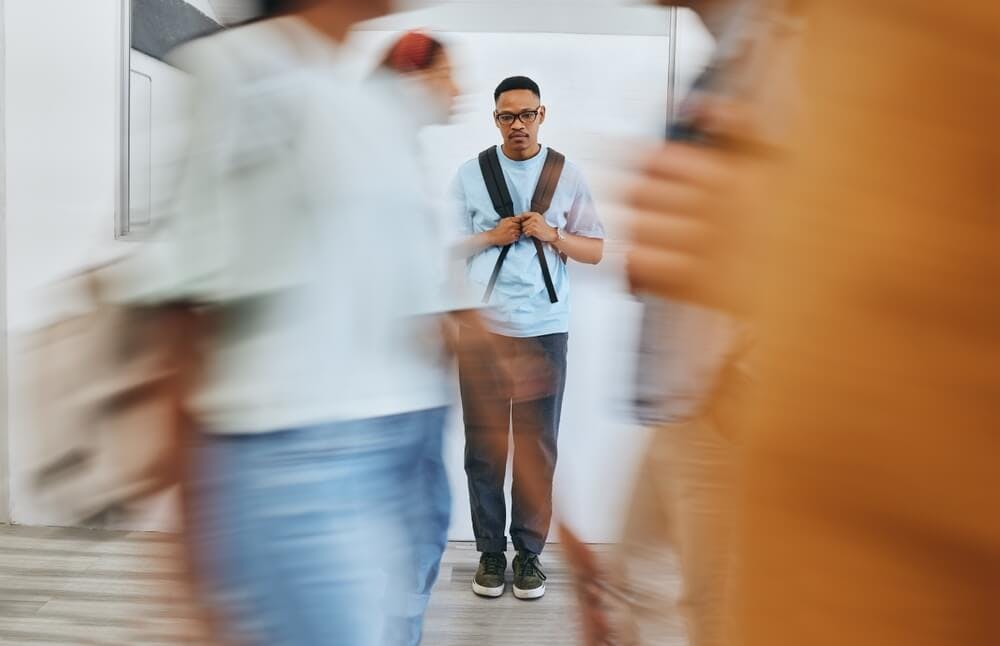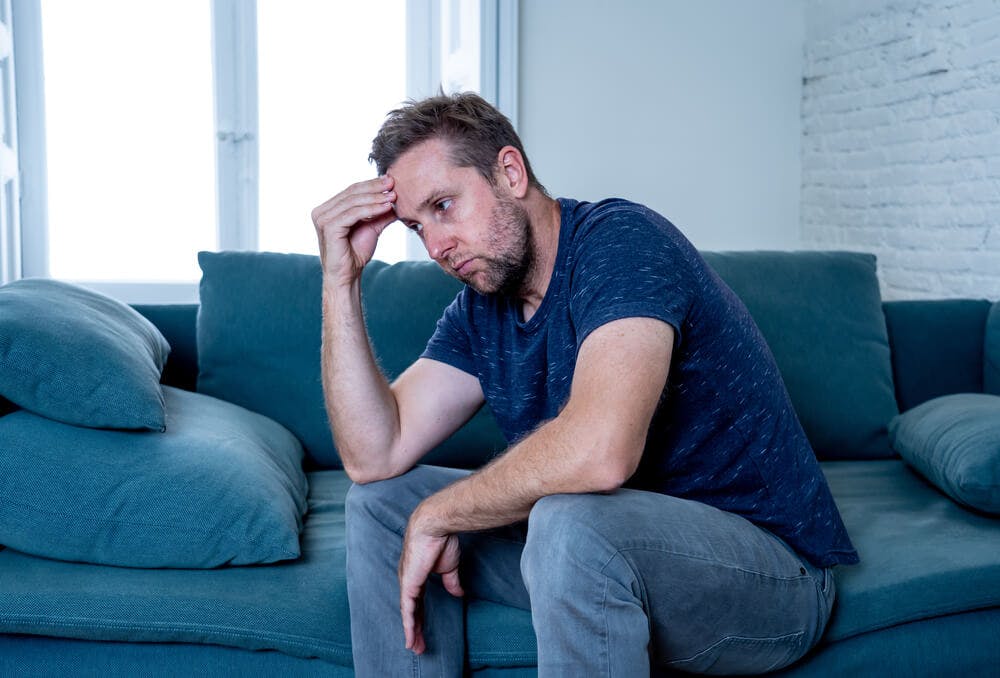What is anxiety?
Anxiety is a feeling characterised by fear, worry, and restlessness. It can make you feel uncomfortable and anxious, or even sweat and have palpitations. It’s natural to feel this way sometimes as your body reacts to life’s stressors, such as uncomfortable social situations.
Sometimes we can become overly anxious to the point that it doesn’t go away and interferes with our daily lives. Having prolonged anxiety can make it hard to cope with everyday challenges.
What are some symptoms of social anxiety?
Social anxiety disorder is characterised by both psychological and physical symptoms.[1] Psychological symptoms can include anxiety in social situations, an increased feeling of self-consciousness around other people, or reliving social situations repeatedly after they have happened.
The physical symptoms of social anxiety consist of profuse sweating, palpitations, nausea, trembling, reddening of the face, and difficulty in speaking. These specific symptoms can be particularly distressing since the sufferer may fear that others will notice and judge them for it. Individuals with a social anxiety disorder may experience a range of such severe symptoms, leading them to avoid even routine social situations.
A diagnosis of social anxiety disorder can typically be made by a doctor if the sufferer has exhibited symptoms that have caused them significant discomfort for at least six months. Even though it is good practice to pay attention to your mental health and actively seek answers for yourself, self-diagnosis of a mental illness is not advised.
Natural responses to stress can be misrepresented as symptoms. The symptoms you demonstrate can also be associated with multiple types of mental conditions. This is why arriving at a diagnosis can be such a complicated affair. Talking to a doctor about your symptoms can help you figure out what’s wrong and receive a proper diagnosis, which is where we at Mosh can be of service to you.
Mosh is here to help you find a practitioner who understands your situation and who can support you with your concerns. All of the practitioners we work with are 100% clinically independent, so your health and well-being are always their top priority. In other words, your Mosh practitioner will only ever advise you on what they think is best for you.
What causes social anxiety in people?
There is not always a single reason behind developing a social anxiety disorder, and several circumstances may contribute to its onset. An individual’s personality, genetics, and experiences from their surroundings, such as bullying, humiliation, and poor treatment in general, are all possible contributors.
It can be challenging for people with anxiety to meet strangers, attend parties, go to work or school, enter a room with a large crowd, return items to a store, or even eat in front of others. Even dating and eye contact, which are both common, everyday experiences, can trigger symptoms.[2]
Social anxiety disorder is common in Australia, and it usually begins when children are young. However, it’s important that not all timid or uncomfortable people have a disorder. Every person has a different level of comfort in social situations that is influenced by their unique set of personality traits and experiences. Some people are naturally more reserved; others are just more extroverted.
If you have other questions, such as ‘What causes anxiety?’ or ‘What are other types of anxiety?’ or if you just want to know how to manage stress better, our doctors at Mosh can provide you with informed opinions on these topics so that you don’t have to settle for any more theories and remedies from the internet.
How is social anxiety treated?
A person with a disorder can improve their ability to interact with others and boost their confidence. The extent to which someone is affected by a social anxiety disorder will determine the best course of treatment. Treatment often entails a combination of medicine and psychotherapy (also known as counselling or talk therapy).[3]
Psychotherapy helps reduce symptoms of social anxiety disorder in most patients. It can improve their self-esteem and social skills, and they can also learn to identify and alter any negative views they have about themselves.
Exposure-based CBT (cognitive behavioural therapy) is a form of this, in which patients gradually increase their exposure to the things they dread to build up coping mechanisms and self-assurance in the face of anxiety-inducing events.
Having social anxiety does not mean you have to be a social wallflower. There are celebrities with anxiety that have made entire careers working in the limelight, including Emma Stone, Ariana Grande, and Hugh Grant.[4]
Even if treatment doesn’t work right away, you shouldn’t give up on it. It may take weeks or even months before you see results. Learning new skills to help deal with anxiety takes time. Finding the most effective medications for your situation can also involve a bit of trial and error.
Like our minds, our bodies are all different. People with social anxiety disorders may not need medication in some cases. Others may need long-term medication to keep them from relapsing.
We at Mosh have got your back!
With Mosh, you don’t have to go through dreaded receptions or waiting rooms to get the help you need because we connect you directly with AHPRA-registered doctors who can provide you with science-backed advice on mental health issues.
You can talk to your doctor through chat, text, or video call and rest easy knowing that whatever you say in a session is completely confidential. We value your privacy. Your healthcare is no one else’s business. That’s why if you’re prescribed medication by a doctor with Mosh, we deliver it to your door for free in discreet packaging.
If you think your doctor isn’t the right fit for you, you can easily switch to a different one. The decision to undergo treatment will always be yours – you won’t be obliged to go through with anything if you are not comfortable with it. We offer automatic product top-ups as part of our subscription plan, or you can place an individual order to test the waters.
In addition to mental health services, Mosh’s online health platform also specialises in tackling skincare, weight loss, and sexual health issues, among others. We don’t believe the old-school stigmas that discourage people from asking questions about health concerns like ‘How to make hair grow faster?’ or ‘How to lose weight?’ or even ‘How to increase libido?’
If you’re looking for a safe space to unpack your worries, you can talk to us whenever you’re ready.

